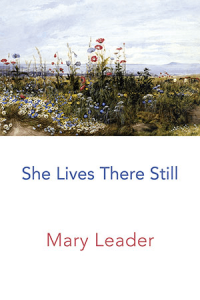She Lives There Still
 Mary Leader, an American lawyer-turned-poet, has found a home with the British-based Publisher Shearsman Books. She Lives There Still is her second title to be published with them, and they are due to re-issue her two earlier works that are currently out-of-print. A fifth collection has already been completed.
Mary Leader, an American lawyer-turned-poet, has found a home with the British-based Publisher Shearsman Books. She Lives There Still is her second title to be published with them, and they are due to re-issue her two earlier works that are currently out-of-print. A fifth collection has already been completed.
Perhaps this match should hold no surprise, given Shearsman’s focus on contemporary poetry which articulate ‘a clear inclination towards the more exploratory end of the current spectrum’. Leader is experimental with form and She Lives There Still offers an intricately organised collection of eleven poems containing two key series: ‘A Warty Chin’ and ‘A Withy Hut’.
It was the personal sequence in the middle of the book which stayed with me long after reading. ‘Cornucopia of Arcadia’ comprises twenty-two sonnets and is, in essence, the poetic documentation of an imagined affair of the heart. The apparent subject of affection chronicled throughout is Arkady Plotnitsky, a fellow Professor at Purdue University where Leader taught. Given that it prompted my repeated return to the book, it deserves to be lingered over in review.
Leader prefaces the section with a quote from the Russian poet Tsvetaeva (‘Love lives on words, and dies of deeds… The word, which for me is already the thing, is all I want.’), perhaps providing a clue as to her overall intent; the ‘relationship’ with Plotnitsky is not defined by any remarkable actions, or deeds, but solely through Leader’s ability to pinpoint the ordinary moments in life where emotions exist palpably beneath the surface.
While remaining steadfast to a fourteen-line, ten-syllable structure, Leader pushes the poetic form to provide a more colloquial and readable style with breaks placed mid-sentence. Extending this, tenses, conversational language, and quotes take the reader directly into situations and narratives to allow a story to unfold as though it was being witnessed:
Reception, crowd buzz, insignificant
Blah blah blah . . but you let me know something
Important: “. . . yeah, they use ton of adjuncts
Yadda yadda my girlfriend lives there. Yeah. . . .”
And so, the reader is immersed whilst also playing observer to the unfolding drama, and drawn onwards into a scenario of complicated relationships. The limited extent of Leader and Plotnitsky’s relationship is most clearly alluded to within the context of book attributions, where Plotnitsky and his partner exchange meaningful dedications in their respective publications and Leader is pleased, ironically, to find herself ‘midrange’ in a list of thanks.
From here, Leader narrates with startling honesty her rejection by another colleage, Fred Abrams, and subsequently reveals regret:
My Please yes and Fred Abrams’ Please no. Two
Incompatible, rising, endless cries.
Cancer and retirement sadly end the sequence, and the feelings for her colleague during these life changes continue to read as a one-sided attachment.
Leader’s unapologetic determination to lay bare her entanglements on the page left me pondering the authenticity of what was written. Plotnitsky exists; I googled him. I was then left having intruded uncomfortably on her privacy unable to escape the reality she creates:
I did not get to be with Fred, and I
Caved in. I did not get to be with you,
And by the way I liked you much better,
But did not cave in.
And so, the prefacing quote from Tsvetaeva (‘Love lives on words’) comes back into view. Leader succeeds in creating a real and tangible love, not from the actions of herself or another, but by writing about a deep affection that would not otherwise have surfaced.
The publisher promotes a quote from The New Yorker describing Leader’s “quite remarkable sensibility, which is one of the most self-possessed in contemporary poetry.” It was through close reading of the ‘Cornucopia of Arcadia’ sequence that I could find truth in this. Leader acutely identifies the complex of emotion underlying the pathos of commonplace interactions with an unrequited love. Her confidence and composure in doing so is a fascination.
Hannah Whaley

Leave a Reply